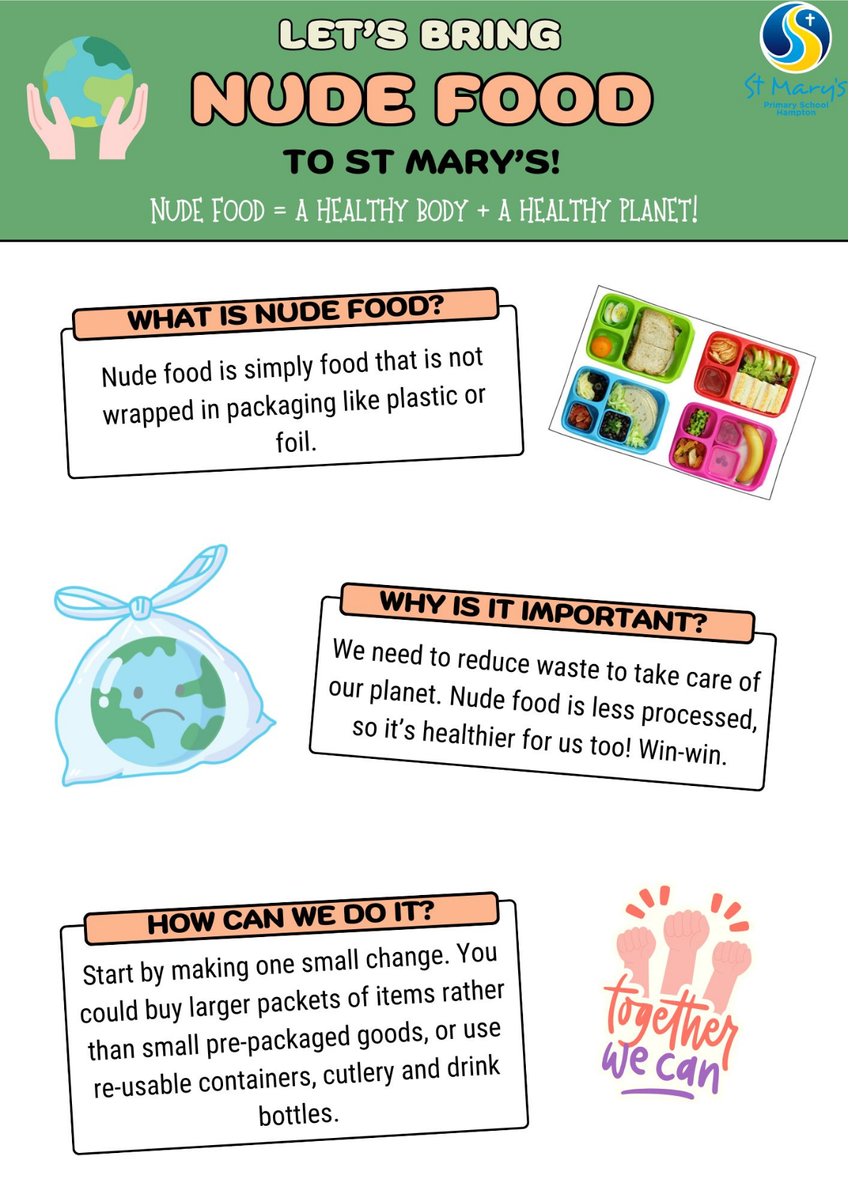Sustainability

NUDE FOOD AT ST MARY’S
Nude Food is a fantastic opportunity to educate children about how their actions can impact the environment and their health. Focussing on the positive message of ‘nude food = a healthy body + a healthy planet’, we want our students at St Mary’s to be empowered to choose healthy, rubbish free food for their lunches and snacks.
HEALTH AND WELLBEING
Schools nation-wide are embracing the nude food revolution and encouraging children to bring a rubbish free lunch to school. For the uninitiated, ‘nude food’ is food that comes to school without disposable packaging – extra plastic bags, paper bags, wrappings, plastic water bottles or cling wraps. Australia is the second highest producer of waste per person in the western world! Unfortunately school lunches are contributing to this, with the average lunch-toting child generating around 30 kg of litter a year. You can do your bit to reduce this by packing a school lunch without including any extra packaging or juice packs.
BOOST YOUR CHILD’S NUTRITION
Did you know that a surprising 95% of Aussie primary school kids aren't getting enough fruit and veggies every day? That’s a huge number! In fact, the 2022 Australian Institute of Health and Welfare Government Department revealed that 66% of Australian adults and 26% of kids are overweight or obese. If this trend keeps up, the future could be pretty concerning. That’s why it’s more important than ever to give our kids the tools and knowledge to make healthy, balanced choices for their future wellbeing. We need to teach them what a nutritious diet looks like, so they can avoid the risks of obesity and live healthier lives. After all, a third of their daily food intake comes from school lunchboxes, so what they eat at school lays the foundation for a lifetime of good health and good habits!
By encouraging Nude Food lunch boxes, we can cut down on packaged, processed foods and up the intake of fresh, whole foods. When compared to fresh options, pre-packaged foods tend to pack in more kilojoules, fat, salt, and sugar—definitely not the best for growing bodies! Try to steer clear of snacks like chips, sweet biscuits, muesli bars, breakfast bars, and processed meats like salami, ham, and pressed chicken. Not only does skipping these processed foods help reduce waste, but it also guarantees your child is getting the best nutrition possible. Let’s fuel their bodies with the goodness they need to thrive! We know that life gets busy and sometimes convenience gets in the way, but if we just make one change to our kids' lunchboxes, we can really make a difference to our health and our planet.
REDUCE LANDFILL AND MAKE A BIG IMPACT
Australia generates a jaw-dropping 1 million tonnes of waste every single year—that’s enough to fill a line of garbage trucks stretching all the way from Melbourne to London and halfway back! We can make a huge difference in reducing landfill by simply ditching things like cling wrap, juice boxes, plastic water bottles, and all the unnecessary packaging that ends up in our bins.
While many kids are already rocking reusable drink bottles, plastic water bottles are still a major contributor to school waste. In Australia, around 1 billion plastic water bottles are thrown away every year, and only 30% of them get recycled. That leaves a staggering 700 million bottles heading straight to landfill or floating in our oceans each year. And guess what? These bottles can take up to 700 years to break down! Plus, they leach harmful BPA into the water kids are drinking—yikes! So, let’s make it a habit: always pack a reusable drink bottle. Not only will you help keep your child hydrated, but you’ll also protect the planet and keep them safe from those nasty plastic chemicals.
Here at St Mary’s our student-led 2024 Waste and Litter audit found that we had low levels of waste and litter within our school and school grounds. We can attribute that to many things, one being students bringing nude food lunch boxes, but we know we can improve that.
SAVE MONEY AND EAT BETTER
Cutting out pre-packaged foods and buying in bulk is not only a great way to save money, but it can also save you time and boost your nutrition! Think about it—homemade snacks like carrot and apple muffins, frittatas, or muesli slices pack way more nutrients than their store-bought counterparts, and you get to control how much sugar goes in, while completely avoiding those pesky preservatives and additives. Plus, by making your own lunchbox treats, you can buy ingredients in bulk—like 5kg of flour in a reusable calico sack, instead of small packages wrapped in plastic or paper.
The same goes for supermarket shopping—skip the 6-pack of yogurts and go for a larger 500g or 1kg tub. Then, just portion it out into individual, leak-proof containers for the lunchbox. Simple! And the best part? There are so many other items you can buy in bulk too, like cheese (no more processed slices), dried fruit, flour, sugar, and more. Not only does buying in bulk save you money, but it also helps cut down on those frequent trips to the store. You can even find suppliers who let you bring your own containers, so you can completely avoid packaging. How awesome is that?
TAKE ANOTHER LOOK AT YOUR LUNCHBOX!
Why not take a fresh look at your lunchbox and make a conscious choice to pack only foods that leave zero packaging behind? Pop that sandwich or bread roll into a reusable lunchbox, use small containers for snacks, and don’t forget to pack a trusty reusable drink bottle! At the end of the day, the only thing left should be an apple core, some crusts, or other food scraps—all of which can go straight into your compost, helping to enrich our soils and reduce waste. It’s that easy to make a big impact!
When our St Mary’s students bring a lunch box full of Nude Food to school, this helps us not only eat well, it also helps us reduce the amount of rubbish that goes into our bins, which ultimately will help us take care of our planet.
We will be providing handy Nude Food tips from our students in upcoming newsletters.
https://www.aihw.gov.au/reports/overweight-obesity/overweight-and-obesity/contents/summary

